|
NOTTINGHAM
DECLARATION
ABOUT -
CONTACTS - FOUNDATION -
HOME - A-Z INDEX
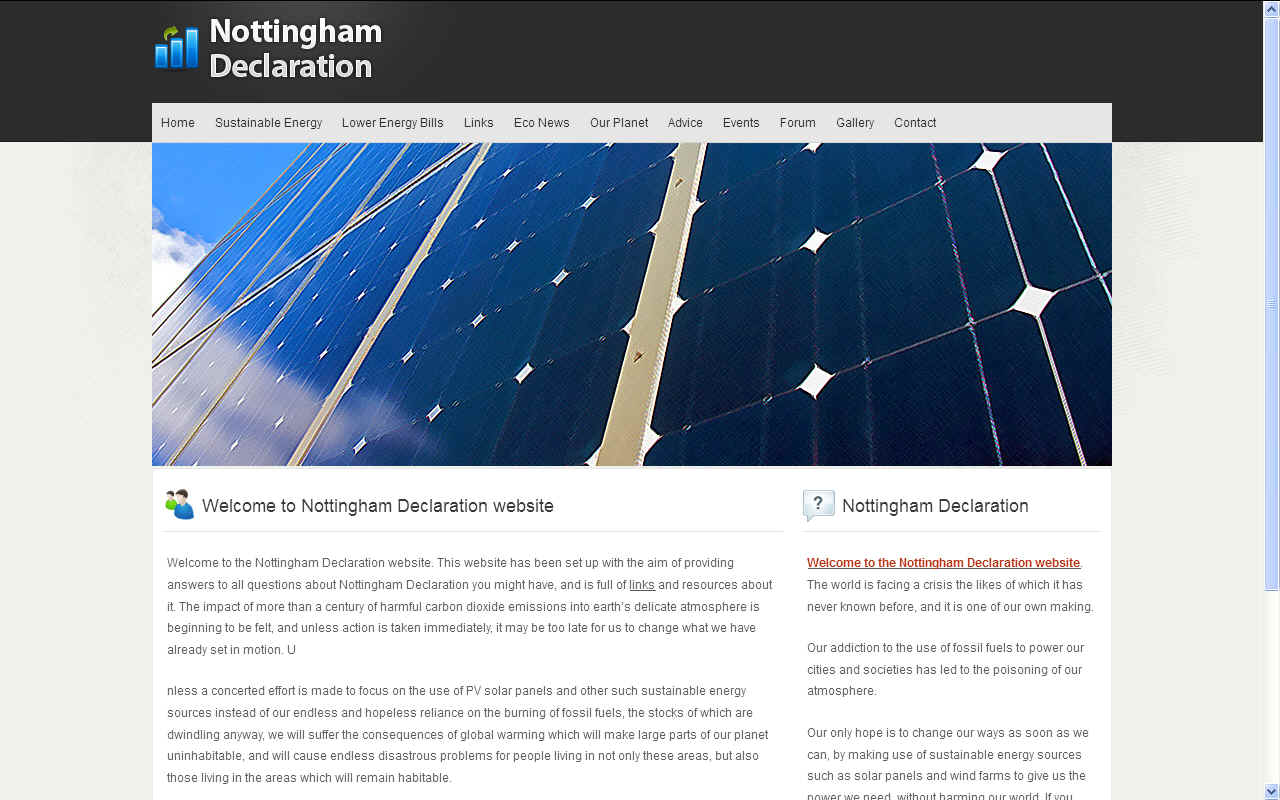
NOTTINGHAM
DECLARATION - According to their website: "Unless a concerted effort is made to focus on the use of PV solar panels and other such sustainable energy sources instead of our endless and hopeless reliance on the burning of fossil fuels, the stocks of which are dwindling anyway, we will suffer the consequences of
global warming which will make large parts of our planet uninhabitable, and will cause endless disastrous problems for people living in not only these areas, but also those living in the areas which will remain habitable.
Our future survival lies in the harnessing of green technologies such as photovoltaic solar panel technology which can allow us to power our homes and cities without poisoning our atmosphere with dangerous chemicals.
Cities of the future need to see a new style of planning and design, with solar panel arrays covering every spare centimetre in order to provide the extensive amount of energy we would require to carry on living as we are currently doing."
DECC
MEMORANDUM OF UNDERSTANDING
Between the LG Group and the Department of Energy and Climate Change 9 March 2011
1. INTRODUCTION
1.1 This MOU has been created in acknowledgement of the pivotal role councils have in tackling climate change: by reducing carbon emissions from their own estate and operations and enabling their residents.
businesses and visitors to reduce their carbon emissions; and by achieving national priorities such as the Green Deal and renewable energy deployment in a locally appropriate way.
1.2 This MOU recognises how councils, through local governance, can ensure climate change policies and programmes protect and
help the most vulnerable, particularly the fuel poor.
1.3 This MOU recognises that policies set at a national level affect the ability of councils to act at a local level, and that local action effects the
ability of national government to meets its targets.
2. PURPOSE
2.1 To set out the partnership arrangements between the Department of Energy and Climate Change (DECC) and the Local Government Group (LG Group), including scope, governance, accountability and roles and responsibilities.
2.2 To set out the DECC and the LG Group will progress the LG Offer on Climate Change starting with the milestones at Annex A.
3. SCOPE - ORGANISATIONAL
3.1 The subject matter of the MOU is the energy and climate change policies within the DECC's remit.
3.2 The MOU is signed by the LG Group as the representative body for council in England. In meeting the objectives of the MOU (as outlined in paragraphs 3.4 and 3.5 below), the LG Group will continue to reflect the insights and ambitions on their member councils.
3.3 The lG Group will work to build the individual commitment of councils to a high level of ambition on carbon reduction.
POLICY
3.4 This MOU sets out the DECC and LG Group partnership approach to helping meet climate change mitigation and related objectives, notably including:
3.4.1 The 80% greenhouse gas emission reduction target in the Climate Change Act 2008 by 2050 against a 1990 baseline.
3.4.2 The fuel poverty targets arising from the Warm Homes and Energy
Conservation Act 2000.
3.4.3 The target to supply 15% of the UK's energy consumption from renewable energy by 2020 as set out in the 2009 Renewable Energy Directive.
3.5 The MOU sets out how DECC and the LG Group will work together to help and encourage all councils to take firm action - underpinned by locally ambitious targets and indicators - that enable councils to:
3.5.1 Reduce the carbon emission from their own estate and operations;
3.5.2 Reduce carbon emission from homes, businesses and transport infrastructure, creating more, appropriate renewable energy generation, using council influence and powers; and
3.5.3 Participate in national carbon reduction initiatives at the local level, particularly the roll out of the Green Deal, smart metering and
renewable energy deployment.
EVALUATION AND REVIEW
3.6 The MOU will be reviewed annually and a report will be produced jointly by DECC and the LG Group by the end of May of each year. The report will set out the achievements of DECC, the LG Group and councils with progress against the milestones set out in Annex A, as well as areas of concern, and any proposals to amend or update the MOU. As set out in 4.2 this will be reviewed and agreed by DECC and the LG Group and published.
3.7 In addition, the MOU will be reviewed at the end of each national five-year carbon budget period - starting in 2013 (for 2008-12). This review will evaluate the success of the MOU in making progress in meeting climate change mitigation and related objectives (in particular in helping to reduce emission accordance with the Climate Change Act 2008 and any other relevant existing or future
climate change legislation). The review will also seek to revise and refresh suitable stretching ambitions in line with new evidence and national targets.
3.8 In accordance with paragraphs 4.2, the success of the MOU will be determined by evaluating:
3.8.1 Progress in meeting the MOU milestones (set out in Annex A);
3.8.2 The proportion of councils singing up to the New Nottingham Declaration (which will
embody a significant step-up ambition) as demonstration of their commitment to continued action on climate change (see 4.5);
3.8.3 Council progress against their commitments set out in the New Nottingham Declaration (see 4.5).
3.8.4 The extent to which the MOU is successfully helping the UK to meet its national climate change
target obligations (tonnes of GHG saved on own estate, and with influence - see data section in section 6).
3.8.5 The extent to which councils are playing an active role in delivering climate change mitigation and related policies, such as the Green Deal.
4. GOVERNANCE and ACCOUNTABILITY
4.1 The Secretary of State for Energy and Climate Change and senior political representative from the LG Group will meet
annually in the spring of each year to review the MOU, the Annual Report and council action on climate change.
4.2 The LG Group Environment and Housing Programme Board will take
responsibility for the MOU within the LG Group. The Devolved, Sub-National Reform and Local Carbon Accountability (DSRLCA) Project Board will take responsibility for the MOU within the DECC. Both boards will respectively review council and DECC action on climate change and agree a
publicly available Annual Report.
4.3 The Secretary of State and a senior political representative from the LG Group will appoint appropriate Senior Civil Servants from DECC and senior responsible officer from the LG Group to work together to ensure that the milestones in Annex A are met.
4.4 The MOU establishes and support a Nottingham Declaration Board or other appropriate representative board, consisting of senior and political representatives from the LG Group, councils and invited partner and delivery organisation, which will collaboratively oversee the Nottingham Declaration Board's Action PLan and council-led agreements and targets. DECC will be represented on the group and other
government departments can observe where appropriate and when invited. The Nottingham Declaration Board's Action Plan will cover the policy areas in the LG Group offer and any other relevant policies that arise during the course of the MOU.
4.5 The Nottingham Declaration Board will design a mechanism for councils to demonstrate their commitment to continued action on climate
change, and will enable them to sign up to locally appropriate targets and goals. This will be in the form of a 'New Nottingham Declaration' (which should be in place by October 2011, as set out in Annex A).
4.6 An officer-leval delivery group consisting of DECC and LG Group officials will meet quarterly to review progress on the MOU, MOU Milestones and general council involvement in reducing carbon emissions.
5. THE MILESTONES
5.1 The milestones set out in Annex A are for the first year of the MOU. These milestones are designed to
establish the Nottingham Declaration Board, the New Nottingham Declaration Board's Action
Plan, as well as the process and timescales for evaluating the success of the MOU through the development of the
Annual Report. Annex A will be updated annually and will set out the strategic actions to be pursued over the subsequent 12 month period - these actions will be agreed as part of the Annual Report.
6. ENERGY and EMISSIONS DATA
6.1 DECC and the LG Group will work together to develop an approach to monitor energy and emission reduction at the local level. This will cover both energy and emissions from:
6.1.1 Council's own estate and operations; and
6.1.2 Local homes, businesses and transport within the council control and influence.
6.2 Data from these two sources will help to underpin the evaluation of the success of the MOU in 3.8.4.
6.3 DECC and LG Group will work together to make data that is already published by DECC and by local councils more visible, transparent and that the opportunities available from the publication of data are fully realised.
7. SUPPORT from and RESPONSIBILITY of DECC
7.1 DECC will work together with the LG Group under this MOU to assist in the delivery of the LG Offer on Climate Change, Nottingham Declaration Board's Action Plan and to enable councils to reduce carbon emission at the local level.
7.2 DECC will work with the LG Group to ensure the experience of councils are reflected in the DECC's ongoing evaluation of policies, and that the Department's future policy positions take into account local ambition and delivery.
7.3 At the beginning of the policy formation process, DECC will consider any impacts of the policy on councils, any delivery role councils can take or contribute to, or where they can be active partners to achieving the objectives of the policy.
7.4 As policies are initiated or adapted, the role of councils and the impact of the policies on councils will be
integral to DECC's approach.
7.5 DECC will facilitate meetings between the LG Group, other government departments, and local government, on energy and climate change issues as identified in the Nottingham Declaration Board's Action Plan.
7.6 Subject to legal and Ministerial advice, DECC will share with the LG Group information relevant to achieving the objectives set out in this MOU. Such information mau include publications, consultations and press materials which may be
disclosed to the LG Group on a confidential basis ahead of their publication.
8. SUPPORT from and RESPONSIBILITY of the LG GROUP
8.1 The LG Group will take a leadership role in encouraging all councils to demonstrate their ambition on climate change through the New Nottingham Declaration and other appropriate agreements or declarations.
8.2 The LG Group will encourage all councils to play their full and active part in reducing emission through the three areas of focus set out in 3.5, and will develop and
implement plans for reaching out to those councils that do not take a full and active part in reducing emission
through the three areas of focus set out in 3.5, and will develop and implement plans or reaching out to those councils that do not take a full and active part in reducing emissions.
8.3 The LG Group will actively seek their council council members' views on the MOU, LG Offer on Climate Change, subsequent action plans and DECC policy. These views will form part of the Annual Report on the MOU. This does not exclude individual councils from expressing their views on DECC policy directly to DECC.
8.4 The LG Group will facilitate meetings between DECC, other government departments, local government on energy and climate change issues as identified in the Nottingham Declarations Board's Action plan.
8.5 Subject to legal and any internal advice provided to the LG Group, the LG Group will share with DECC information relevant to
achieving the objectives set out in this MOU. Such information may include
publications, consultations and press materials which may be disclosed to the DECC on a confidential basis ahead of their publication.
9. STATUS OF THE MEMORANDUM
9.1 This Memorandum is a statement of intent, and should not be interpreted as a binding agreement. it does not creae legal obligations between the parties.
10. SIGNED
Rt Hon Chris Huhne MP, Secretary of State for Energy and Climate Change
Councillor Richard Kemp, Vice Chair of the Local Government Association
The Department of Energy and Climate Change (DECC) was created in October 2008, to bring together: energy policy and climate change mitigation
policy.
Climate change is not only a massive threat to the global environment, it is also perhaps the greatest economic challenge facing us in the twenty-first century. It demands an urgent and radical response across the developed and developing world.
At the same time, the UK needs to secure clean, safe, affordable energy to heat and power our homes and businesses. Creating a low carbon and
resource efficient world means making structural changes to the way we work and live, including how we source, manage and use our energy.
DECC exists to take the lead in tackling these challenges, and reflects the fact that climate change and energy policies are inextricably linked - two thirds of our emission come from the energy we use. Decisions in one field cannot be made without considering the impacts in the other.
THE LOCAL GOVERNMENT GROUP
The Local Government Group is made up of six organisations that work together to support, promote and improve local government.
- Local Government Leadership
- Local Government Association
- Local Government Improvement and Development
- Local Government Employers
- Local Goverment Regulation
- Local Partnerships
Department of Energy & Climate Change
3 Whitehall Place
London, SW1A 2AW
http://nottinghamdeclaration.org.uk/
www.decc.gov.uk
www.local.gov.uk
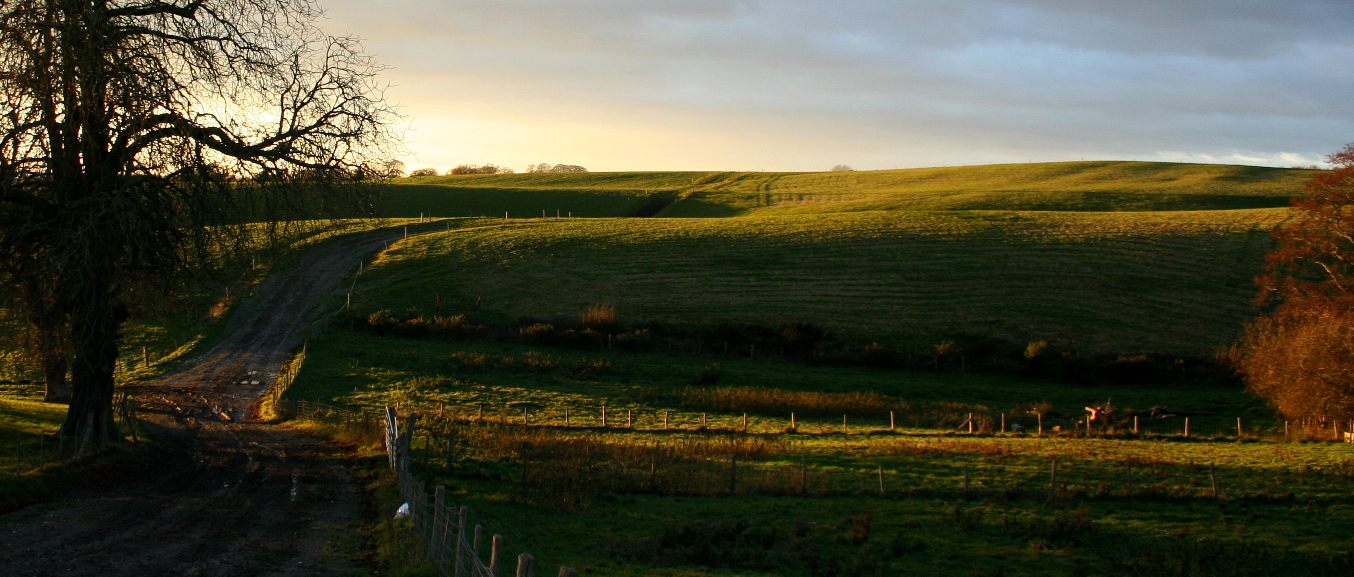
CLIMATE
CHANGE ACTS
The
Climate
Change and Sustainable Energy Act 2006, followed by the Climate
Change Act 2008, are the two current pieces of legislation
that Wealden must abide by.
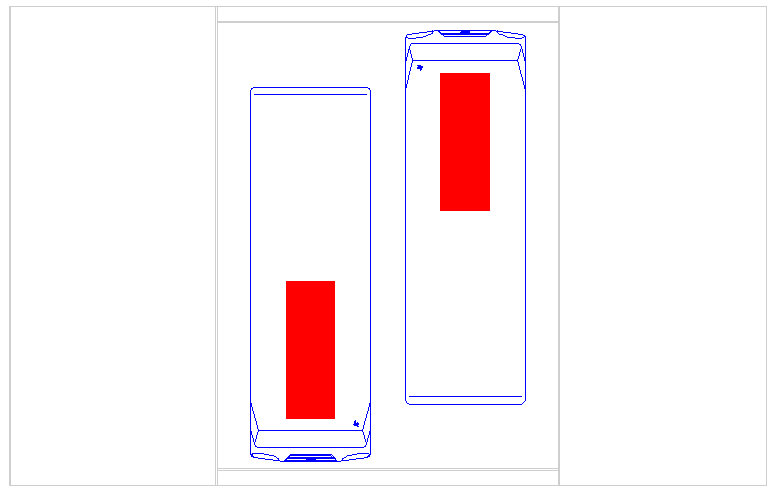

BLUEBIRD™
SMART SERVICE STATION - THE DEVONSHIRE
PROJECT: Shown here is a concept Bluebird™ 7.68 - 15.36MW
solar assisted service station containing 48-96 cartridges on
a continuous charge cycle. Five of these stations (76.8MW)
could recharge (refuel) up to 10 trucks or cars a minute. Next
time you visit your Amoco,
Chevron,
BP
Shell,
Texaco
or Supermarket fuel pump, count the number of cars leaving the
station in a minute. You will find that an electric forecourt
holds the potential to be quicker. During rush hour, 300
vehicles might be serviced in one hour. The truck shown here
is 3.55 wide x 3.5 high x 7.7M long (8 x 11.5 x 25 feet). This
station could accommodate trucks 4.46M (14.77 feet) high as
shown, or with a raised roof, almost any truck currently on
the market - though longer thinner trucks are more fuel
efficient.
During
an eight hour day 2,400 trucks might be serviced using five
forecourts on the assumption that we start every morning with
96 x 5 = 480 slow charged cartridges from off-peak supplies.
The same forecourt might be used to service fuel-cell
cars powered by stabilized hydrogen. One size fits all. The
secret is to KISS
the design (Keep It Simple Silly). There are only 28* moving
parts in this station, not including the gearbox for the solar
powered drive motor. This is possible because with this system
the vehicles load the cartridges themselves. Learn more about
this concept.
BLUEBIRD™
UNIVERSAL ENERGY CARTRIDGE CONCEPT: These cartridge are
designed so that they may hold many types of energy storage
medium: lithium batteries and fuels
cells being the most likely, though hybrid forms are also
to be considered. The internal volume is approximately 0.290m2
or 16 cubic feet. The difficult part is getting the motor
manufacturers to agree these basic dimensions. Failing which,
to take the decision from them with directives. In our opinion
a study is needed to define the capacity that will suit all of
the car and truck makers.
Cartridges
could cost as little as $20,100 US dollars
per unit (£15,000 GBP), hence the investment in terms of
battery cartridges for five stations would in the region of
$9.65 million
dollars. The stations themselves could be built as
pre-fabricated flat-packs for around $5 million dollars to
which the land value and planning costs would need to be
added. Ignoring the land variable for now, each SMART station
would run @ $2,828,600 dollars or £2,186,286 pounds each.
That is about the same price as some McDonalds
franchises.

FLAT
PACKS
- In this bungalow design for a two bed roomed eco home, a car
port is part of the roof where the pitch is angled to the sun
and the area is sufficient to power the home and provide
energy to charge a small electric car. If grouped into a
village of 50 - 100 units, the surplus electricity from one
unit may be shared with other units to create a 'smart' energy
self-sufficient society of the future. At 17.77 x 8.62 metres
(48' x 28' feet) this concept world cost about $93.000 dollars
(£70,000 pounds). The car shown here is a very small (low)
city car about the same length as a Smart
car, hence the garage area appears rather large.
These
units could be mass produced to lower the price even more. If
only there was identified land on which to place them, any
council could begin to build a sustainable society based on
clean renewable energy.
One
of our advocates would be prepared to waive his fees, if the
local authority concerned would be prepared to waive theirs on
an outline application for 50 units - on land that would be
identified by the advocate, with the appropriate notice served
on the (farmer) landowner. How about it fellers?
FORMAT
AGREEMENT
- Without the infrastructure for transport built into the
equation for Smart town and cities, the zero carbon society is
likely to take a lot longer to achieve. Transports
infrastructure is therefore the starting point in the fight
against climate change. The starting point for a viable
infrastructure is a Universal Energy Cartridge something along
the lines of the draft design in these diagrams. Getting
vehicles makes to agree a suitable format is probably one of
the biggest hurdles to overcome and is likely to require
national and international agreements and the passing of laws
in the signatory states.

LINKS
& REFERENCE
Email: contact@nottinghamdeclaration.org.uk
https://www.sustainablehomes.co.uk/
COUNCILLORS SERVING IN 2017 INTO 2018
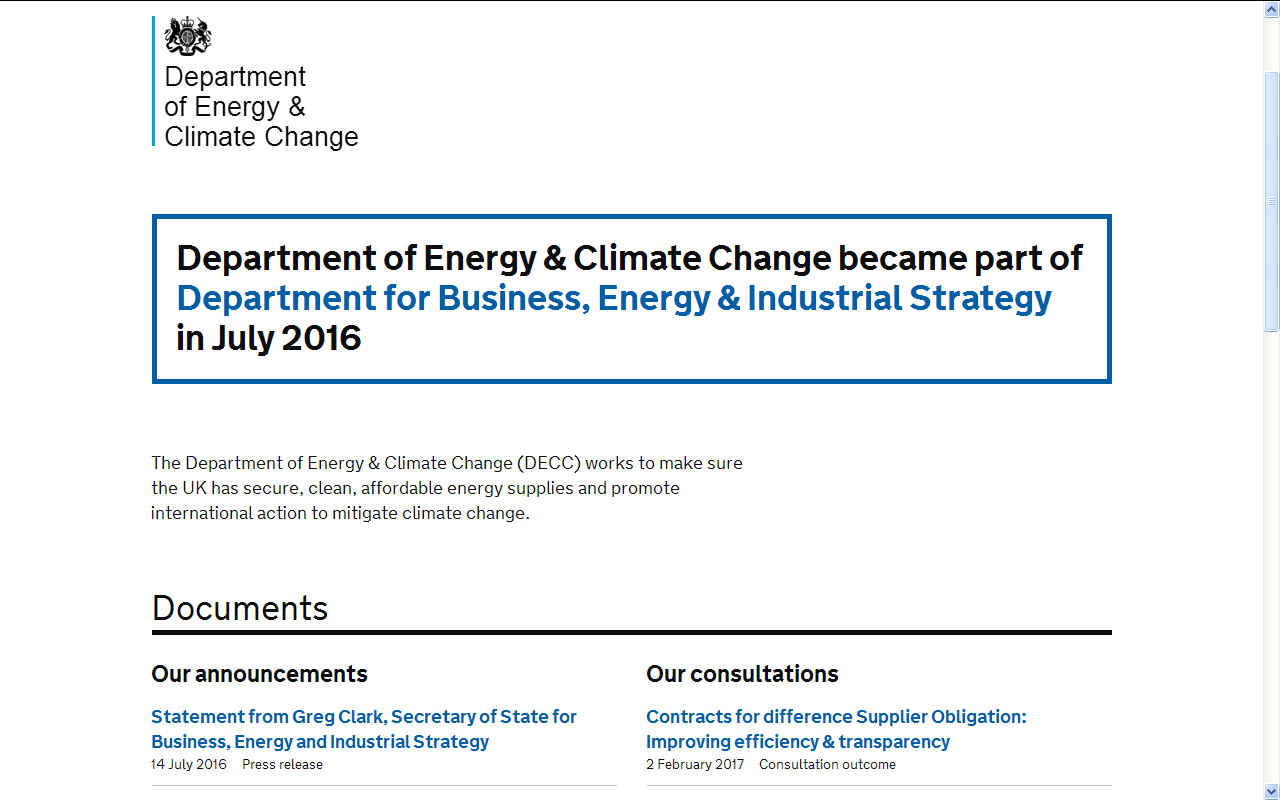
INDUSTRIAL
STRATEGY - The UK's Industrial Strategy sets out a long term plan to boost the productivity and earning power of people throughout the UK.
It sets out how we are building a Britain fit for the future – how we will help businesses create better, higher-paying jobs in every part of the UK with investment in the skills, industries and infrastructure of the future.
Their 5 foundations align to a claimed vision for a transformed economy:
* ideas: the world’s most innovative economy
* people: good jobs and greater earning power for all
* infrastructure: a major upgrade to the UK’s infrastructure
* business environment: the best place to start and grow a business
* places: prosperous communities across the UK
The UK Government say they will set Grand Challenges to put the UK at the forefront of the industries of the
future, but they don't say how they will achieve this other
than working with industry, academia and civil society over the years ahead to build on the UK’s strengths, make more of
untapped potential and create a more productive economy that works for everyone across the UK.
We look forward to hearing more on this, with especial regard
to Climate
Change and ocean waste reduction.


LINKS
TO COUNCILLORS PAST & PRESENT
Dick
Angel - Jo
Bentley - John
Blake - Bob
Bowdler - Don
Broadbent - Norman
Buck - Raymond
Cade - John
Carvey - Lin
Clark
Nicholas
Collinson - Nigel
Coltman - Ronald
Cussons - Barby
Dashwood-Morris - Dianne
Dear - Phil
Dixon - Pam
Doodes
Claire
Dowling - Jan
Dunk - Louise Eastwood - Philip
Ede - Helen
Firth - Jonica
Fox - Roy
Galley -
Richard Grocock - Jack
Gore - Chris
Hardy
Steve
Harms - Jim
Hollins - Peter
Holloway - Johanna
Howell - Brian
Hubbard - Stephen
Isted - David Larkin - Andy
Long - Michael
Lunn
Barry
Marlowe - Nigel
McKeeman - Huw Merriman - Rowena
Moore - Kay
Moss - Douglas
Murray - Ann
Newton - The
Lord Newton - Ken Ogden
Amanda
O'Rawe - Charles
R Peck - Diane
Phillips - Mark
Pinkney - Eddie
Powell - Major
Antony Quin RM - Ronald
Reed - Dr.
Brian Redman
Carol
Reynolds - Greg
Rose - Peter
Roundell - William
Rutherford - Daniel
Shing - Oi
Lin Shing - Raymond
Shing - Stephen
Shing
Robert
Standley - Susan
Stedman - Bill Tooley - Jeanette
Towey - Stuart Towner - Chriss
Triandafyllou - Peter
Waldock
Neil
Waller -
David Watts - Mark Weaver -Graham
Wells - David
White - John
Wilton - Brian
West
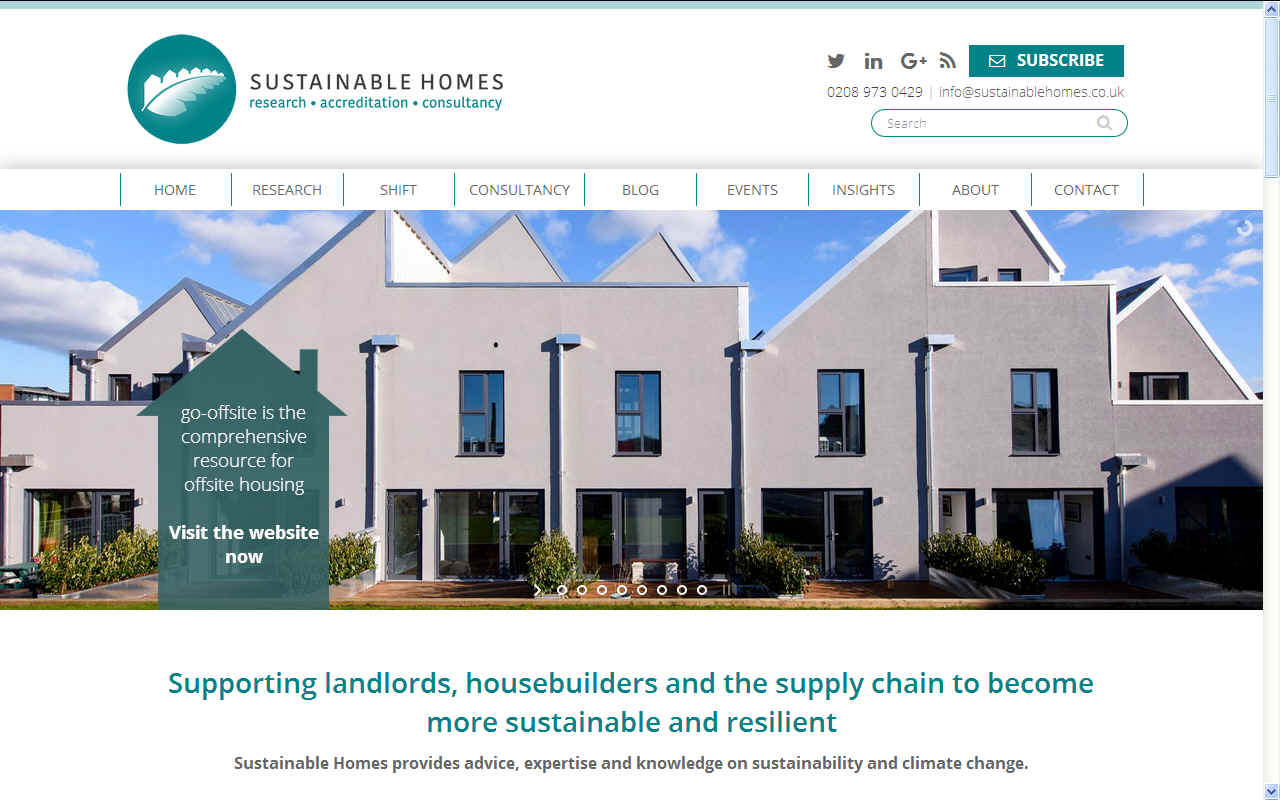
This
website is provided on a free basis as a public information
service. Copyright © Cleaner
Oceans Foundation Ltd (COFL) (Company No: 4674774)
2018. Solar
Studios, BN271RF, United Kingdom.
COFL
is a charity without share capital.
|
































































